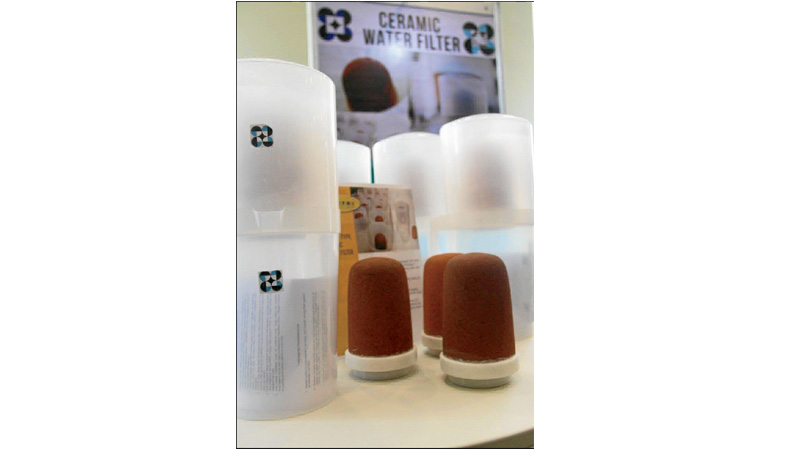Cheap way to filter water for the poor

FOR SAFE WATER Pitchers with water filters made from red clay, shown in photo taken from PCIEERD’s Facebook page, can make water from deep well and faucets clean and safe to drink.
SOMETIMES, there is a simple solution to a complex problem.
For some 1.5 million Filipino households without access to safe drinking water, the Department of Science and Technology (DOST) recently developed a pitcher equipped with a water filter made from red clay that can make deep well and tap water clean and safe to drink.
“Hopefully, with this technology that is very cheap and reusable, we will help more Filipinos get access to clean and potable water,” said Carlos Primo David, executive director of the Philippine Council for Industry, Energy and Emerging Technology Research and Development (PCIEERD).
PCIEERD funded the project initiated by DOST’s Industrial Technology Development Institute (ITDI) in 2014, following Supertyphoon “Yolanda” (international name: Haiyan) that devastated Eastern Visayas, leaving thousands of people dead and some four million others homeless.
The ceramic water filter project was headed by Blessie Basilia, chief of the ITDI-Materials Science Division.
Article continues after this advertisementIt was undertaken with the country’s “severe water pollution problems” in mind, David told the Inquirer in a recent interview.
Article continues after this advertisement“This was also partly inspired by Yolanda because clean water sources became a problem in most parts of Eastern Visayas. So this was a solution for that,” he said.
Premature deaths
Nearly 6,000 premature deaths occur in the country every year due to waterborne diseases, according to the Philippine Institute for Development Studies.
Citing a 2010 study by the Department of the Interior and Local Government, the DOST said diarrhea was rampant in the country because 432 municipalities where 1.5 million households outside Metro Manila had no access to safe drinking water.
“In a nation with severe water pollution problems, these affected families may be able to get their potable drinking water if their houses are outfitted with ceramic water filters,” it said.
If households with poor water sources will be equipped with this filtering device, the country’s accessibility rate to potable water would rise from 82.9 percent in 2007 to 86.6 percent this year, according to DOST.
The ceramic filter developed by DOST-ITDI makes use of micro-filtration technique, which is an effective way to get rid of infectious microorganisms, said Dr. Ruby Raterta, a senior science researcher for the environment sector.
Cost-effective
It is also cost-effective and sustainable since red clay is an abundant resource in many parts of the country, such as Ilocos Sur, Isabela, Aurora, Tarlac, Camarines Sur, Sorsogon, Aklan, Leyte and South Cotabato provinces, and Cagayan de Oro City.
The filter can purify tap water and those from deep well and springs, Raterta said. Tests also showed that water purified by the ceramic filter conformed with the Philippine National Standard for drinking water, she added.
But the use of rain and floodwater are still prohibited. “There is an ongoing research to find out whether the filter can also be used to purify water from rain or flood because these sources have other contaminants aside from microorganisms. They also contain heavy metals,” she pointed out.
Targeting the distribution of an initial 20,000 water filters to various barangays, DOST has started mass producing the product in Isabela, Vigan, Bauko in Mt. Province and Tacloban City, Raterta said.
Some of the filters have been distributed to National Housing Authority households in Muntinlupa City and Cagayan de Oro and in 10 barangays in Quezon City.
“We recommend that they use it in the barangay center so that more people can benefit from it,” she added.